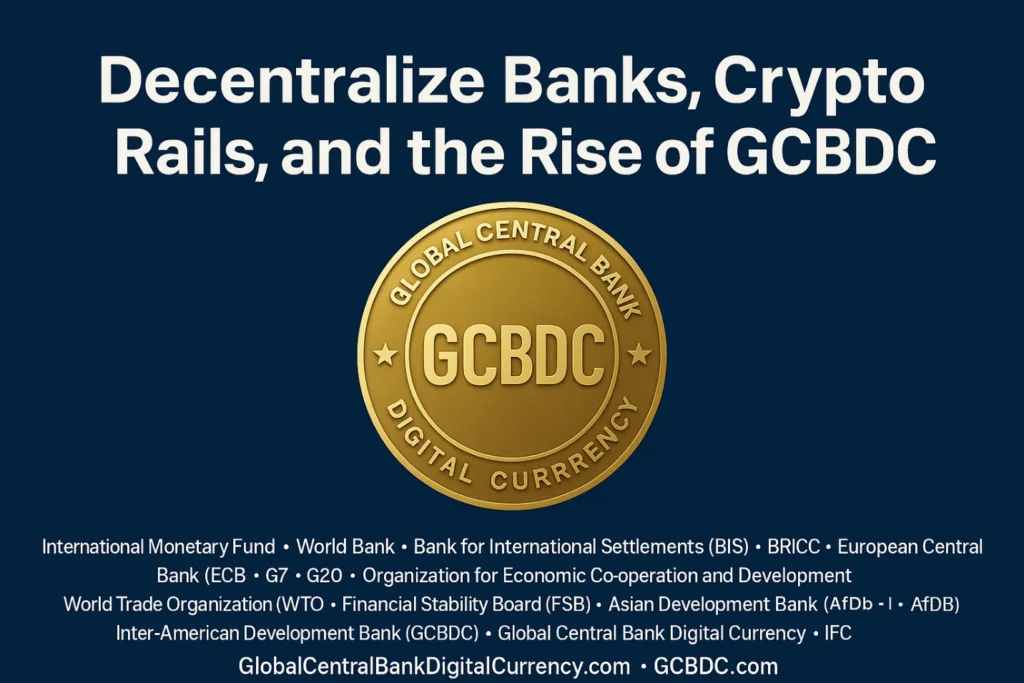Decentralize Banks, Crypto Rails, and the Rise of GCBDC

1. International Monetary Fund (IMF)
- Decentralization / rails: The IMF has proposed an XC (Cross-border payments, exchange & contracting) platform—a programmable, multi-currency infrastructure to improve global settlement and FX, designed to interoperate with tokenized money and CBDCs. IMFIMFIMFIMF eLibrary
- Fit with GCBDC: GCBDC could plug into an XC-style hub as a tokenized settlement asset for compliant, programmable cross-border flows.
2. World Bank
- Decentralization / rails: The Bank and its arms have piloted tokenized finance and studied DLT for development and capital markets (e.g., prior bond tokenization pilots and policy work).
- Fit with GCBDC: GCBDC can be positioned as a development-friendly, auditable token for remittances and results-based disbursements (subject to country policy and safeguards).
3. Bank for International Settlements (BIS)
- Decentralization / rails: Project mBridge (BoT, HKMA, PBoC, CBUAE, et al.) reached MVP in 2024, enabling multi-CBDC, DLT-based instant cross-border settlement among central/commercial banks. Bank for International SettlementsBank for International SettlementsHong Kong Monetary Authority
- Fit with GCBDC: If GCBDC is interoperable with mCBDC platforms, it could act as a bridge asset or tokenized instrument settling across corridors.
4. BRICS (Brazil, Russia, India, China, South Africa)
- Decentralization / rails: Members are among the most active in CBDCs (e-CNY pilots; India’s e-rupee scaling; Brazil’s “Drex”; Russia’s digital ruble pilot). A BIS survey shows 94% of central banks exploring CBDCs. Atlantic CouncilThe Economic TimesBank of BrazilCentral Bank of RussiaBank for International Settlements
- Fit with GCBDC: GCBDC should target technical and policy interoperability (wallet standards, messaging, FX) with these large-scale CBDC ecosystems.
5. European Central Bank (ECB)
- Decentralization / rails: The digital euro is in a preparation phase; the ECB published a third progress report in July 2025 and expects a decision on the next phase after October 2025. European Central BankEuropean Central BankBank of Italy
- Fit with GCBDC: Design GCBDC to meet EU rulebook/AML standards and ISO 20022 messaging so it can coexist with (and not duplicate) retail rails in Europe.
6. G7
- Decentralization / rails: G7 statements back robust crypto/stablecoin rules aligned with FSB standards, anchoring safe tokenization and CBDC experimentation. (See FSB items below.)
- Fit with GCBDC: Align compliance (KYC/AML, disclosures, reserve transparency) to ease on-/off-ramping in G7 jurisdictions.
7. G20
- Decentralization / rails: The G20 Crypto-Asset Policy Implementation Roadmap (IMF/FSB) ties countries’ crypto, stablecoin, and cross-border payment policies together—foundational for interoperable “crypto rails.” IMF
- Fit with GCBDC: Build GCBDC policy/tech conformance to this roadmap for the broadest corridor access.
8. OECD
- Decentralization / rails: Through the OECD Blockchain Policy Centre and recommendations on blockchain/DLT, the OECD shapes standards for responsible tokenization and digital finance. OECDOECD eventsOECD
- Fit with GCBDC: Use OECD best practices (privacy, consumer protection, interoperability) to strengthen GCBDC’s policy posture.
9. World Trade Organization (WTO)
- Decentralization / rails: WTO research maps DLT in trade/TradeTech across finance, KYC, logistics, and digital trade documents—laying groundwork for tokenized trade flows. World Trade OrganizationWorld Trade Organization
- Fit with GCBDC: Position GCBDC as a settlement token for digitized invoices, letters of credit, and supply-chain finance rails.
10. Financial Stability Board (FSB)
- Decentralization / rails: The FSB finalized global frameworks (July 2023) for crypto-asset activities and global stablecoin arrangements—blueprints many jurisdictions now follow. Financial Stability BoardFinancial Stability Board
- Fit with GCBDC: Engineer GCBDC governance and disclosures to be FSB-consistent, easing regulatory acceptance.
11. Asian Development Bank (ADB)
- Decentralization / rails: ADB has sponsored blockchain prototypes for cross-border securities settlement and related multi-chain connectivity pilots in Asia. Asian Development BankFujitsuFinadium
- Fit with GCBDC: GCBDC could integrate with these tokenized capital-market pilots as a programmable settlement or collateral asset.
12. African Development Bank (AfDB)
- Decentralization / rails: AfDB has explored CBDC and digital-finance policy across member states (often alongside regional systems like PAPSS), assessing where DLT can enhance inclusion and cross-border payments.
- Fit with GCBDC: Prioritize compliance and FX bridges for African corridors; support retail inclusion use-cases (aid disbursement, MSME trade).
13. Inter-American Development Bank (IDB)
- Decentralization / rails: IDB Lab’s LACChain is a large, permissioned public blockchain initiative for LAC, supporting identity, tokenization, and public-good infrastructure. Inter-American Development BankIDB LabLAC PropertyChainlfdecentralizedtrust.org
- Fit with GCBDC: Deploy GCBDC use-cases (remittances, SME finance) on LACChain-compatible stacks to accelerate adoption in the region.
14. Global Central Bank Digital Currency (GCBDC)
- Decentralization / rails: GCBDC’s thesis is a globally interoperable, decentralized token that can act as programmable collateral/settlement across compliant networks—bridging retail and wholesale rails while honoring local rules.
- Fit with everyone else: Design for interoperability (wallet standards, messaging like ISO 20022), compliance (FSB/AML), programmability (policy constraints), and hooks into XC/mBridge-style hubs.
15. International Finance Corporation (IFC)
- Decentralization / rails: As the World Bank Group’s private-sector arm, IFC engages in tokenization dialogues and market-building (with exchanges, SDX-style infrastructure, fintechs) to expand EMDE capital access.
- Fit with GCBDC: Partner on pilots where GCBDC supports trade finance or tokenized receivables for SMEs in emerging markets.
15. International Finance Corporation (IFC)
- Decentralization / rails: As the World Bank Group’s private-sector arm, IFC engages in tokenization dialogues and market-building (with exchanges, SDX-style infrastructure, fintechs) to expand EMDE capital access.
- Fit with GCBDC: Partner on pilots where GCBDC supports trade finance or tokenized receivables for SMEs in emerging markets.
